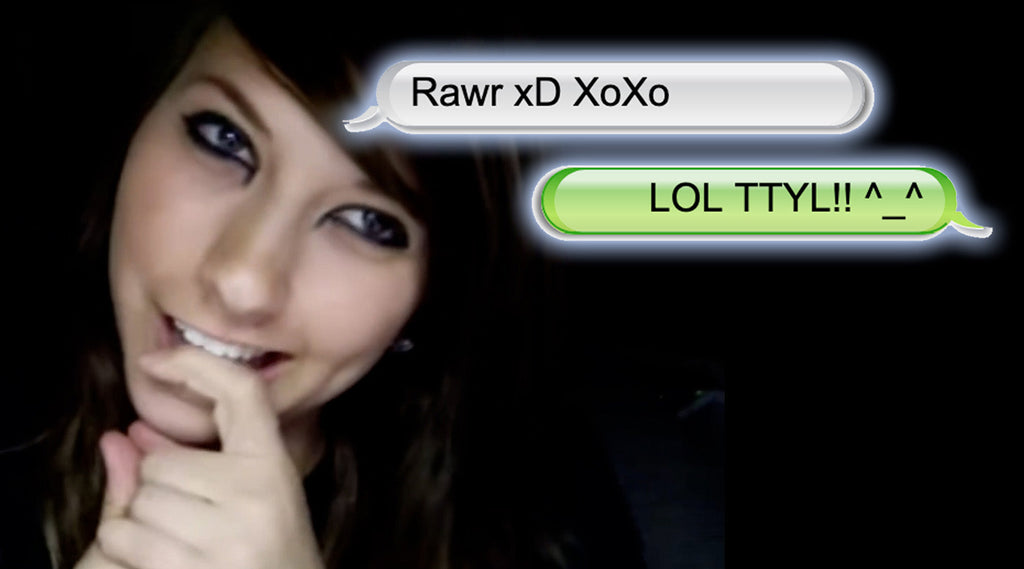
From Swag to Aura the Evolution of Internet Slang

How Millennial and Gen Alpha Language Tells a Digital Story
Internet slang and shorthand text were convenient ways for us millennials to communicate with the limitations of the technology we had.We didn't just participate in digital communication we were its architects. The internet slang we pioneered, from "LOL" to "TTYL," became the foundation of online language. Now our kids are rewriting the rulebook with terms like "no cap" and "rizz," evolving language faster than our old dial-up internet could load a webpage. As the generation that arguably invented online communication, we're uniquely positioned to decode this fascinating language evolution. Let's explore how our kids communicate with their online language.

The Slang Time Capsule: Our Millennial Roots
Internet slang was a badge of cultural belonging for many millennials. Our slang was out of necessity during the evolution from analog to digital with limited texting characters and slow internet speeds. Acronyms like “LOL” (laugh out loud) and “OMG” (oh my gosh) dominated AIM chats and early social media. We crafted our language in the digital Wild West on MySpace comments, LiveJournal blogs, and early Twitter. Remember when "epic" meant something extraordinary? When "random" was the peak of quirky humor? Humor often stemmed from random pop media and early memes shaped how we talked. It's not so different today in how our kids pick up their slang.
Gen Alpha: The Digital Native Language Revolution
Our kids are taking language evolution to an entirely new level. Where we adapted to digital communication, they're born into it. Their slang is influenced by the fast-paced, visually driven platforms they frequent. TikTok challenges, viral trends, and gaming communities are their main sources. Unlike the slow trickle of slang words for us, platforms like TikTok allow terms to go viral and fade within weeks. Take "rizz" for example – a term meaning charisma or the ability to attract a romantic partner. It's a perfect example of how Gen Alpha's language is simultaneously more concise and more nuanced than our millennial speak.

Millennial VS Gen-Alpha Slang
Let's break down some of the slang that's similar to the terms we used in our youth:
- "Game" vs "Rizz" (To charm or attract)
- "Noob" vs "Skibidi" (Inexperienced, bad, or dumb)
- "Player" vs "Alpha" (Popular individual among a group)
- "Softie" vs "Beta" (The nice guy/girl)
- "On Fleek" vs "Slay" (Exceptionally well or impressive)
- "Swag" vs "Aura" (How one presents themself)
- "Bomb" vs "Bussin" (Impressive or delicious)
- "Epic" vs "Canon" (Important moment/experience)
- "Trippin" vs "Delulu" (Delusional or confused)
- "Sketchy" vs "Sus" (Unsettling or cautionary)
- "Whipped" vs "Simp" (One-sided attraction/relationship)
Text Acronyms:
- "OMG" vs "ONG" (Oh My God / On God)
- "TTYL" vs "LMK" (Talk To You Later / Let Me Know)
- "TBH" vs "NGL" (To Be Honest / Not Gonna Lie)
- "JK" vs "FR" (Just Kidding / For Real)

Text Faces to Emojis
Remember the golden age of text-style emojis? Back in our day, we used our creativity to craft emotions through punctuation. A simple :) conveyed happiness, :( was all about sadness, and if you were feeling extra silly, there was always xD. For a touch of quirkiness or joy, ^_^ and (^o^)/ brought some flavor to chats. Now our kids can pick from numerous emojis to demonstrate a wide variety of emotions. Instead of typing out emotions, they tap on images like 🥹 (puppy dog eyes), 🤩 (starstruck), or 😭 (ugly crying). Emojis now capture everything from nuanced feelings to specific situations or topics
Here's a side-by-side comparison:
- :) =😊
- :( = 😔
- xD = 😂
- ^_^ = 😌
- :P = 😜
- :'( =😢
While we relied on keystrokes to share emotions, our kids use of emojis offers more precision and universality. Emojis have also become a new way to tell stories, where a string of icons can replace entire sentences. Our kids' emoji-driven communication is not just about saving time; it's a cultural shift toward more visual, less text-heavy interaction. But let's not forget, the roots of their emoji game started with our creative keyboard shortcuts.
The Millennial Parent's Challenge
We're the first generation of parents who can genuinely understand and translate internet language from our experience developing the earliest forms of it. Our kids aren't just speaking modern slang, they're communicating through an entirely different digital dialect that's relevant to the pop media they see.
Playful Tips For Family Bonding With Slang:
- Ask our kids to explain their slang
- Use their slang occasionally as playful banter (we are the parents trying to be hip with the kids now)
- Understand the context and origin of new terms
- Recognize that language evolves as a form of cultural expression
The Deeper Meaning: More Than Just Words
Our generation witnessed the birth of Internet communication. We saw digital communication transform from formal email exchanges to 280-character tweets. Today we witness our children create a linguistic ecosystem more fluid, global, and instantaneous than we could have imagined. Gen Alpha's slang isn't just about being trendy. It's a sophisticated communication method that reflects global connectivity, rapid information processing, creative expression, and community building.
As millennial parents, we didn't just survive the internet revolution we helped create it. Now, we get to guide our children through their own linguistic landscape, understanding that language is a living, breathing entity. So the next time your kid drops a "mid" or talks about someone's "main character energy," take a moment to appreciate the linguistic journey. We're not just hearing new words we're witnessing a digital communication evolution. Let's ask our kids what their favorite slang terms are and why!



















